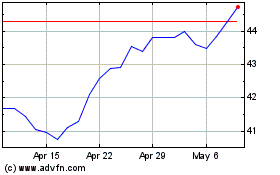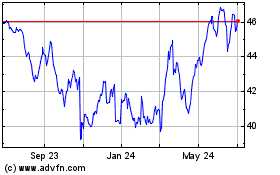By Saabira Chaudhuri
This article is being republished as part of our daily
reproduction of WSJ.com articles that also appeared in the U.S.
print edition of The Wall Street Journal (April 20, 2018).
Shares of tobacco companies tumbled after Philip Morris
International Inc. said cigarette shipments fell more than expected
and sales for its cigarette alternative started to stall in a key
market -- raising wider alarm about the health of the entire
tobacco industry.
Shares in the New York-listed, Switzerland-based tobacco giant
ended down 16%. That was its biggest one-day slide since becoming a
public company in March 2008. The disappointing first-quarter
results dragged down shares of other giants, like Altria Group
Inc., British American Tobacco PLC and Imperial Brands PLC.
Big Tobacco has long been under threat from the steady decline
of smoking, particularly in the developed world. But in recent
years, the industry has been able to push through price increases
to make up for falling volumes -- boosting profits and stock
prices. That has enabled big investments aimed at developing
smoking alternatives, like e-cigarette devices and other gadgets
that promise to deliver nicotine but not the more harmful effects
that come with tobacco combustion.
New headwinds have emerged, punctuated by Philip Morris's
disappointing quarterly results on Thursday. Overall, the Marlboro
maker reported earnings of $1.56 billion on revenue that climbed
14% to $6.9 billion, slightly less than the $7 billion analysts
polled by Thomson Reuters had expected.
The company, which sells cigarettes under brands like Marlboro
around the world, but not in the U.S., said shipments fell 5.3%
during the first three months of the year. That was much steeper
than expected -- even considering what analysts expected to be a
fairly easy comparison from the year-earlier period.
Drops came in big markets that had traditionally held up better
than most, such as Japan, Russia and Saudi Arabia. That underscored
fears that decline rates for smoking in some of the markets seen as
relatively robust may also be increasing.
More worrying for many investors was Philip Morris's
disappointing sales growth for its biggest bet on cigarette
alternatives -- a device called IQOS and billed as a "heat not
burn" product. The electric device heats a plug of ground tobacco
-- but doesn't combust it -- delivering nicotine and an experience
that smokers have said is closer to real smoking than vaping or
other alternatives. The company says because users don't inhale
many of the toxins associated with combustion, the device is
safer.
While Philip Morris has rolled the product out in a number of
markets, the company is awaiting approval from the Food and Drug
Administration in the U.S., which said earlier this year that the
science on the device's relative safety wasn't yet conclusive.
One of the most promising markets for the device has been Japan,
where IQOS has eaten quickly into the market share of regular
cigarettes. But Philip Morris said Thursday that IQOS gained just 3
percentage points of the country's overall cigarette market share,
almost half the percentage-point increase in the previous
quarter.
"Device sales were slower than our ambitious expectations,"
Philip Morris Chief Financial Officer Martin King said on a call
with investors.
That surprised many observers who had been used to heady growth.
The double hit to sentiment about traditional cigarettes and their
potential replacements raised broader concern about the future of
the industry. BAT and Imperial Brands closed down 5.4% and 2.9%,
respectively, in London. Altria -- which Philip Morris hopes to
team up with to sell IQOS in the U.S. should it receive approval
from the FDA -- was off 6% in trading in New York.
All three companies didn't immediately return calls for
comment.
While tobacco companies have so far been able to offset
declining volumes with rising prices, that strategy is seen as
having limits, and companies are scaling back investments in
traditional tobacco operations. Philip Morris and its rivals have
spent billions of dollars in recent years to research and market
tobacco-heating and other new products they believe will help lure
smokers from conventional cigarettes.
Japan has been a bellwether for the industry -- both because of
the country's still-large smoking population and its recent, fast
embrace of smoking alternatives.
Philip Morris launched IQOS there in 2016, and its performance
has been closely watched by investors and public-health researchers
as a test case for how so-called reduced-risk products could catch
on with consumers.
Smoking rates in the country have plummeted after IQOS's
introduction. Japan Tobacco Inc., Japan's biggest cigarette company
and a proxy for the market, said sales fell 14.5% in March, in line
with declines in February and January attributed to smokers turning
to smoking alternatives, like IQOS. The shortfalls were even
sharper this time last year and analysts had hoped to see less grim
results.
Instead, "cigarette sales are falling at a rate never before
seen in a major market," said David Sweanor, chair of the advisory
board of the Centre for Health Law, Policy & Ethics at the
University of Ottawa.
IQOS has captured 16% of the Japanese tobacco market -- and
Philip Morris has pointed to that success as an indication of what
could be achieved elsewhere.
Mr. King, the company's finance chief, warned of a maturing
market in Japan, saying Philip Morris had run through early
adopters quicker than expected and must win over "the
more-conservative consumers, especially the age 50-plus smoker
segment, which represents approximately 40% of the total adult
smoker population."
He added: "We are therefore adjusting our commercial plans in
terms of the timing, intensity and content of communication to
specifically address the needs of these adult smokers."
Write to Saabira Chaudhuri at saabira.chaudhuri@wsj.com
(END) Dow Jones Newswires
April 20, 2018 02:47 ET (06:47 GMT)
Copyright (c) 2018 Dow Jones & Company, Inc.
Altria (NYSE:MO)
Historical Stock Chart
From Mar 2024 to Apr 2024

Altria (NYSE:MO)
Historical Stock Chart
From Apr 2023 to Apr 2024
